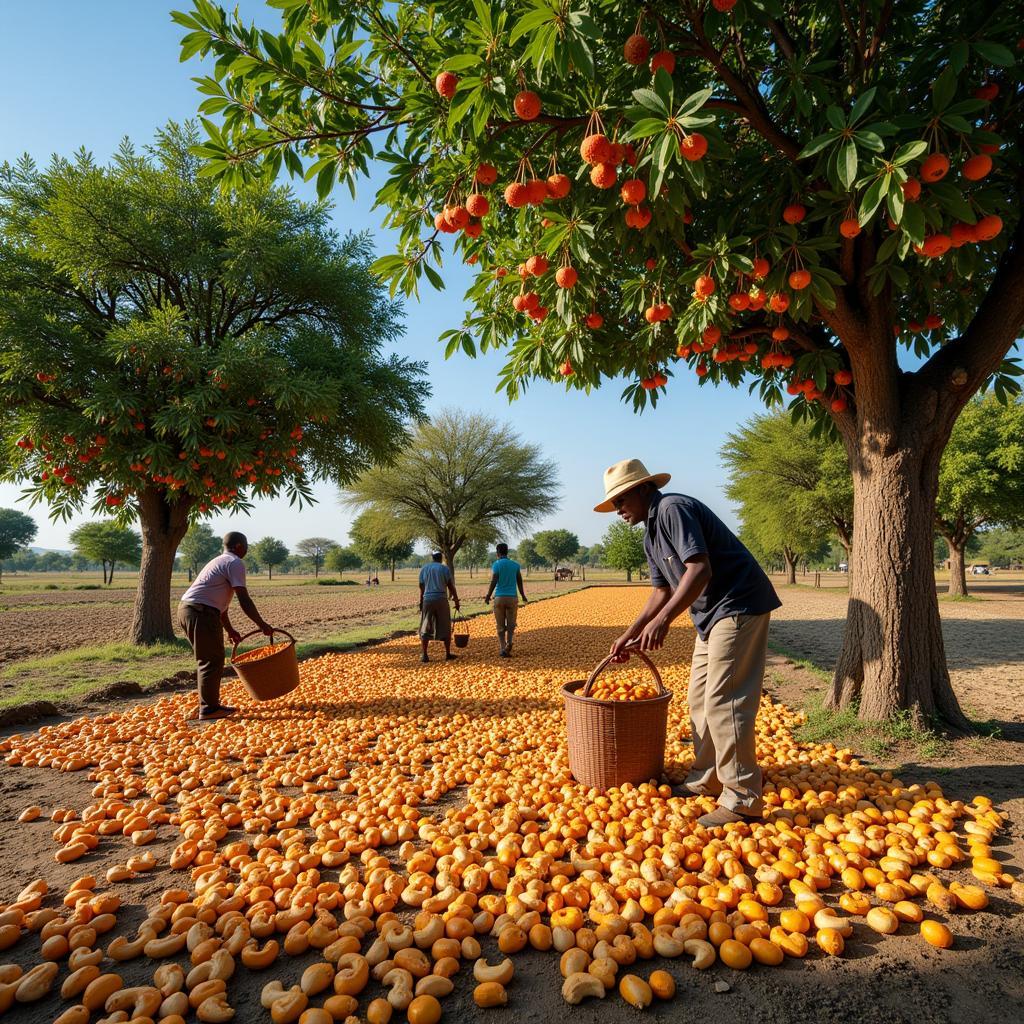Unveiling the African Cashew: A Journey from Seed to Global Market
The African Cashew, a small nut with a creamy texture and a subtly sweet flavor, has made its way from humble beginnings to become a global culinary sensation. This journey, however, is about much more than just taste. It’s a story deeply intertwined with the lives of millions across the African continent, their economies, and their connection to the world.
From Ancient Origins to Modern Delicacy: The African Cashew Story
Originating in Brazil, the cashew tree found a welcoming home in Africa centuries ago, brought over by Portuguese explorers. The climate and soil, particularly in East and West African nations, proved ideal for this hardy tree to thrive. Today, Africa stands as the world’s largest producer of raw cashew nuts, contributing to more than half of the global supply.
More than just a nut: The impact of African cashew
The African cashew’s impact extends far beyond just delicious snacks and versatile ingredients. For many nations across the continent, cashew production is an economic lifeline. Countries like Côte d’Ivoire, Tanzania, Nigeria, and Benin rely heavily on cashew exports, providing vital income and employment opportunities for millions of people, particularly in rural areas.
This reliance on cashew farming, however, presents its own set of challenges. Fluctuating global african cashew nuts price significantly impact local economies. Additionally, a large portion of African cashews are exported raw, meaning that a significant chunk of the value addition and job creation happens outside the continent.
Cracking the Shell: Unveiling the African Cashew Trade
While Africa leads in raw cashew nut production, a large percentage is exported for further processing, primarily to countries like India and Vietnam. This disparity highlights a crucial aspect of the African cashew trade – the need for increased local processing capacity.
Adding Value at Home: The Push for Local Processing
Several African nations are actively working to move beyond just exporting raw cashew nuts. By investing in local processing facilities, these countries aim to capture more value from their cashew production, creating jobs and boosting their economies. This shift towards local processing has the potential to transform the African cashew industry, empowering local communities and making them active participants in the global value chain.
Beyond the Numbers: The Human Face of African Cashew
It’s crucial to remember that the African cashew story is ultimately about people. From the farmers who meticulously tend to their cashew trees to the workers in processing factories, each cashew nut represents livelihoods, aspirations, and a deep connection to the land. By supporting ethical sourcing and fair trade practices, consumers worldwide can play a vital role in ensuring that the benefits of the African cashew trade truly reach those who contribute the most.
The Future of African Cashew: Challenges and Opportunities
The African cashew industry stands at a crossroads. While challenges like climate change, market volatility, and limited access to finance persist, there are also significant opportunities for growth and transformation.
Unlocking the Full Potential: Innovation and Sustainability
By embracing sustainable farming practices, investing in technology, and fostering collaboration across the value chain, the African cashew industry can overcome its challenges and realize its full potential. This includes:
- Promoting sustainable farming practices: Supporting farmers in adopting climate-smart agriculture techniques to enhance resilience and productivity.
- Improving infrastructure: Investing in better transportation, storage facilities, and access to markets to reduce post-harvest losses and improve efficiency.
- Empowering women: Recognizing the significant role women play in cashew farming and processing, ensuring equal opportunities and access to resources.
- Attracting investments: Encouraging both domestic and foreign investments in local processing and value addition to create more jobs and boost local economies.
The African Cashew: A Taste of Promise
The African cashew is more than just a tasty snack; it represents a vital economic lifeline for millions across the continent. By supporting sustainable practices, fair trade, and local processing, consumers worldwide can savor the unique flavor of African cashews while contributing to a more equitable and prosperous future for the communities that cultivate this extraordinary nut.
Frequently Asked Questions about African Cashew
1. What makes African cashews different?
African cashews are known for their creamy texture and delicate flavor. The diverse climates and soil conditions across the continent contribute to the unique taste profiles of cashews from different regions.
2. Are African cashews ethically sourced?
The ethical sourcing of African cashews is a critical concern. Look for certifications like Fairtrade and organic labels that ensure fair wages, safe working conditions, and environmentally sustainable practices.
3. How can I support the African cashew industry?
You can support the African cashew industry by choosing ethically sourced products, advocating for fair trade policies, and supporting organizations that work directly with cashew farmers.
4. What are the health benefits of African cashews?
Cashews are a good source of healthy fats, protein, fiber, vitamins, and minerals, offering various health benefits like improved heart health, blood sugar control, and weight management.
5. Where can I find high-quality African cashews?
Look for reputable online retailers, specialty stores, and grocery stores that source their cashews directly from African producers and prioritize ethical and sustainable practices.
Explore More About African Cuisine and Culture
- African agricultural exports
- African cookie recipes
- African grey parrot food in india
- African development bank cote d& 39
Do you have more questions about African cashews, cuisine, or culture? Feel free to reach out to us.
Contact Us Today!
- Phone: +255768904061
- Email: kaka.mag@gmail.com
- Address: Mbarali DC Mawindi, Kangaga, Tanzania
Our team is available 24/7 to assist you with any inquiries or support you may need.


